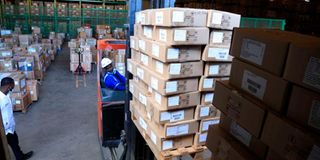Faith Oneya: Let’s set aside our egos for the sake of Aids patients

Kemsa staff packing HIV drugs before being dispatched to various counties at Kemsa warehouse in Embakasi, Nairobi, on April 22, 2021.
“Why give aid if it leads to corruption?” asks economist Dambisa Moyo in her provocative book, Dead Aid: Why Aid is Not Working and How There Is a Better Way for Africa. One of her answers to this poignant question is that “the decision to lend to less-than-reputable government is couched in the view that if they didn’t, the poor would suffer, health and education budgets wouldn’t be met and countries would falter”.
The Tom-and-Jerry games between the Kenyan government and US Agency for International Development (USAid) brought this question to mind. The Daily Nation reported that the lives of 1.5 million HIV patients are in danger as life-saving drugs worth Sh2.1 billion remain stuck at the port of Mombasa over a tax dispute between Kenya and the donor, USAid.
The Kenyan government reportedly slapped them with a Sh90 million tax bill after USAid bypassed Kenya Medical Supplies Authority (Kemsa), favouring a private distributor, Chemonics. They don’t trust Kemsa.
But who would? Given that it is a place where people bag deals “through prayers” or simply through “walking by the premises”,as two ‘tenderpreneurs’ described it when grilled over irregularities of awarding tenders at Kemsa by the Public Investment Committee.
Corruption scandals
USAid, Kemsa’s long-standing partner, can’t claim ignorance about the agency’s never-ending corruption scandals. With Kenya ranked 28th out of 100 on the global corruption index (according to 2020 data from Transparency International), USAid must have known all along that they were not dealing with angels. So, what has changed, exactly?
It is now time to apply Ms Moyo’s theory here. It means USAid, with the full knowledge that the aid given in the form of ARVs might not be distributed in the manner in which it was intended, still went ahead to continue with their partnership with the tainted Kemsa because there are people for whom ARVs are a matter of life and death.
Perhaps driven by a restless sense of self-righteousness, neither the Kenyan government nor USAid has ceded much ground. On April 7, the Ministry of Finance gave the go-ahead for the clearance of a consignment of life-extending drugs for HIV and Aids patients after a public outcry. Still, the latest media reports indicate that not much has changed.
The acrid smell of corruption in Kenya, while highly regrettable, is nothing new. We’ve lived in its stench since independence, so it can’t be the sole reason donors give for refusing to provide the country with much-needed aid. It’s great to demand accountability and transparency, but not at a time like this when the lives of 1.5 million Kenyans are at stake.
This is not a call for a celebration of our flaws but a plea to set aside egos, politics and hypocritical demands to save lives.
Does anything else matter at the end of the day?
@FaithOneya; [email protected]





